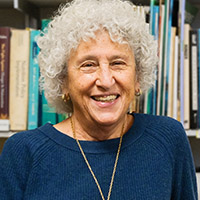Confused by Nutrition Research? Blame Big Food
 Episode 17 of Unconfined, in which the pioneering nutritionist and food-studies scholar Marion Nestle discusses her career-long project of showing how food corporations influence academic nutrition research to their benefit—and often the public's detriment.
Episode 17 of Unconfined, in which the pioneering nutritionist and food-studies scholar Marion Nestle discusses her career-long project of showing how food corporations influence academic nutrition research to their benefit—and often the public's detriment.

Marion Nestle Wants You to Know That Food Is Political
By Tom Philpott Subscribe to Host Notes
Food has been political since the dawn of agriculture 10,000 or so years ago—and probably before. So, New York University nutritionist and pioneering food-studies scholar Marion Nestle didn't invent the concept of "food politics." But she did codify a robust vision for what it means for the 21st century United States in her groundbreaking 2002 book Food Politics: How the Food Industry Influences Nutrition and Health.
The ultra-processed US diet did not emerge from some latent desire among consumers for foodstuffs brimming with industrially produced meat and dairy, pumped up with sweeteners, fats, and other additives, she showed. Rather, Nestle's analysis suggested, it developed because large food corporations found that with the rise of industrial agriculture after World War II, such products could be churned out quite cheaply and sold quite profitably. And they invested a portion of the resulting profits in ensuring a friendly regulatory environment by showering Washington, DC, with campaign donations and lobbyists; and another portion in ubiquitous marketing, particularly to children. The result, Nestle showed, was a nutritional landscape dominated by unhealthy food, to the benefit only of shareholders in the corporations that churned it out. For a generation of journalists—including me, then an obscure finance writer—the book marked out food politics as a topic that one could spend an entire career exploring.
Nestle has been churning out important work on these topics ever since, and she has emerged as a go-to source for journalists (again, including me) who need help explaining complicated nutrition or food-policy concepts. Indeed, there's a saying among us: Marion always delivers—or "MAD" for short. Her blog, Food Politics, retains the must-read status it established when she started it in 2007.
In the latest episode of Unconfined podcast, I caught up with Nestle. We discussed her illustrious academic career and how she got her start, her career-long project exposing the influence food-industry money exerts on academic nutrition research, and her take on one of the hottest topics in nutrition: the category of "ultra-processed foods." Nearly a quarter century after I first encountered her work, I'm still learning from her. Click "play" on this episode and you will too.
Marion Nestle was the 2010 Edward & Nancy Dodge Lecturer at the Center for a Livable Future, and in 2008 she was a commissioner on the Pew Commission on Industrial Farm Animal Production.
In Host Notes, the voices behind Unconfined podcast deliver additional context to supplement our interviews. Their views do not necessarily reflect those of the Johns Hopkins Center for a Livable Future or the Johns Hopkins University.